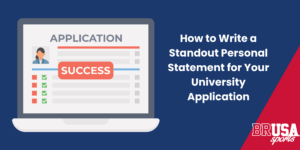How to Write a Standout Personal Statement
How to Write a Standout Personal Statement for Your University Application
Writing a personal statement for a university application is an opportunity to showcase your personality, achievements, and aspirations. With a 600-word limit, every sentence matters. This blog will guide you through the process of crafting a compelling and authentic essay that leaves a lasting impression on the admissions team.

1. Understand the Essay Prompt
Start by carefully reviewing the essay prompt. Is it open-ended, asking you to “tell us more about yourself,” or does it focus on a specific topic, such as challenges, goals, or a transformative experience? Your response should directly address the prompt while showcasing your individuality.
If the prompt is broad, think of it as your chance to tell your story: your values, achievements, and what makes you unique.
2. Brainstorm Your Key Ideas
Before writing, take some time to reflect on the following questions:
- What are the most important aspects of my background and identity?
- What challenges have I faced, and how have they shaped me?
- What achievements or experiences am I most proud of?
- What are my goals, and how can this university help me achieve them?
Focus on personal, authentic experiences that set you apart from other applicants. Whether it’s an unusual hobby, a leadership role, or a lesson learned, your story should highlight what makes you unique.
3. Grab Attention with a Strong Opening
The introduction is your chance to hook the reader. Start with a memorable anecdote, a surprising statement, or a question that draws them in.
For example:
“Growing up in a family of storytellers, I’ve always been captivated by the power of words. Whether it was crafting bedtime tales for my siblings or pitching an idea for my high school newspaper, I learned early on that stories could inspire change.”
This sets the tone for your essay and provides a glimpse into your personality.
4. Structure Your Essay
A well-organized personal statement is easier to follow and more impactful. Here’s a simple structure to guide you:
Introduction:
- Start with your hook.
- Briefly introduce the main theme of your essay.
Body Paragraphs:
- Background and Values: Share a key aspect of your identity or experience that has shaped who you are.
- Achievements and Skills: Highlight your accomplishments and the qualities that helped you succeed.
- Aspirations and Fit: Discuss your goals and how the university aligns with them.
Conclusion:
- Reiterate your enthusiasm for the university.
- Leave the reader with a lasting impression by ending on a positive, forward-looking note.
5. Write with Authenticity
Admissions officers want to get to know the real you, and the personal statement is the perfect opportunity to do this! Be honest and authentic, use your natural voice and avoid clichés.
Instead of saying, “I am passionate about helping others,” show it through an example:
“Volunteering at the local food pantry taught me the power of small actions. Watching families leave with hope and a smile showed me how compassion can make a tangible difference.”
6. Use Specific Examples
Specifics make your essay memorable. Describe experiences with vivid details to bring them to life. For example, rather than writing, “I worked hard to balance school and sports,” say, “Balancing a full course load while captaining my hockey team taught me how to manage my time and prioritize effectively.”
7. Connect Your Goals to the University
Show the admissions team why you’re excited to join their institution. Mention specific programs, opportunities, or values that resonate with you.
For instance:
“I’m particularly drawn to your Global Studies program, as its interdisciplinary approach aligns with my dream of working in international development.”
8. Polish Through Revisions
Great writing takes time. After completing your personal statement first draft, step away for a while before revisiting it with fresh eyes. Here’s how to refine your essay:
- Clarity: Ensure your ideas flow logically and are easy to follow.
- Grammar and Style: Check for errors and awkward phrasing. Software like Grammarly can be great for this.
- Word Limit: Stay within the 600-word count without sacrificing meaning.
Ask a teacher, mentor, or trusted friend for feedback. They can provide valuable insights on whether your essay effectively communicates your story.
Final Thoughts
Writing a personal essay is more than just a requirement—it’s your chance to share your story with the university. By focusing on authenticity, organization, and specific examples, you’ll create an essay that not only tells the admissions team about you but also shows why you’re an excellent fit for their institution.
Good luck, and remember: your story matters!
Examples of personal essays – CollegeVine
At BRUSA Sports, we’ve spent years helping students with their applications and personal statements!
To find out more please complete our evaluation form and we’ll be in touch!

